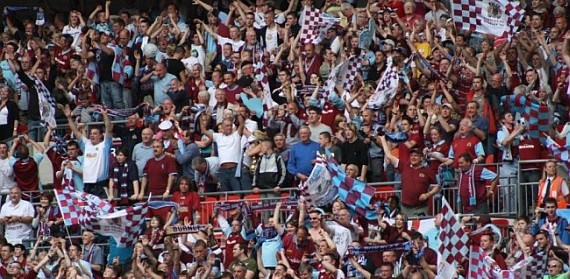|
I believe that music played over the PA system is limiting the creativity of our supporters, giving them less freedom to express themselves. Suppressing the noise that can be made at Turf Moor will also harm the clubs image and tradition. I believe the use of goal music and the very concept of the match experience should be analysed and stripped down.
While not all Americanised introductions to the club have been without their uses (I'm not keen on this music either), the factor of goal music imparts a form of regimented celebration onto supporters. The same pattern is followed at Turf Moor every time a goal is scored: 1. Goal, 2. Cheer, 3. Goal Music, 4. Vacuum of Sound. 5. Chanting after a set period of time. This suppresses the sound of initial cheer after a goal, which I cherish as one of the more beautiful sounds I have heard in my lifetime. This suppression doesn't help the fact that Turf Moor isn't a success acoustically. Goal music also puts supporters onto a fixed track when goals are scored - creativity is stifled in terms of singing new songs and it even prevents existing songs from being sung. Spontaneity therefore dies.
My view is that the idea of goal music and pre match entertainment was well intentioned in terms of trying to generate an atmosphere where one isn't present in the stadium. Unfortunately, in trying to help supporters to create an atmosphere, the club has taken the power away. I see the silence in a football ground as a canvas for supporters to paint with song. But then why paint, when there is something already on the canvas?
This is why the main creativity, in terms of new songs, has come at away grounds, where the shackles are not on the supporters. There was even an example of creativity at the parade to celebrate promotion, in the nature of an expenses song sung at Alastair Campbell. I don't know which club first introduced goal music, but I would suspect that it was in a league lower than the top flight, with low crowds and a flat atmosphere.
Goal music also muddles a club's identity with others. I have heard Tom Hark played at many grounds when a goal has been scored, Sheffield Utd, Reading and Ipswich to name a few; therefore we get lumped in with all the other clubs that play goal music and can't generate their own atmosphere. Put another way, the issue of goal music is something that can cause people to forget what Burnley is all about - the club is more defined by the music they play after a goal, rather than the more important values of history and tradition.
The coming of goal music and pre match entertainment also harms the image of the club in the eyes of other supporters and the world at large. Since we have been promoted I have had conversations with lots of fans of other clubs about what our promotion means. I have heard comments such as that they are "glad to see a club like Burnley" in the Premier League. While I am not naive enough to believe that every supporter in England hopes that we do well, I do think that our history and tradition are respected in certain quarters. In most interviews with Barry Kilby, Brendan Flood and Owen Coyle the history and tradition of the club are brought up in a positive way. The emphasis on the 50th anniversary of Burnley FC being champions and the kit we are wearing is another sign that it is seen as the clubs greatest attribute. The presence of music after every goal erodes the impact of these twin factors. When one looks at the great names in our league, such as Manchester United and Liverpool, they too are clubs that have a strong association with history and tradition. Burnley belongs with these clubs, but with goal music we will be taken less seriously and still be thought of as "lower league". The ultimate effect is that it cheapens our greatest attributes - history and tradition.
Turf Moor will have no problem generating an atmosphere this coming season due to the well publicised rush for tickets and also the decision to place home fans alongside the away fans. This should foster a noise and creativity that one would associate with a healthy atmosphere. Therefore, the key reason for introducing goal music and other bells and whistles does not exist anymore. Restoring the fan's freedom and creativity will ensure that our history and culture remain intact and will ultimately aid our club in becoming truly Premier League.
